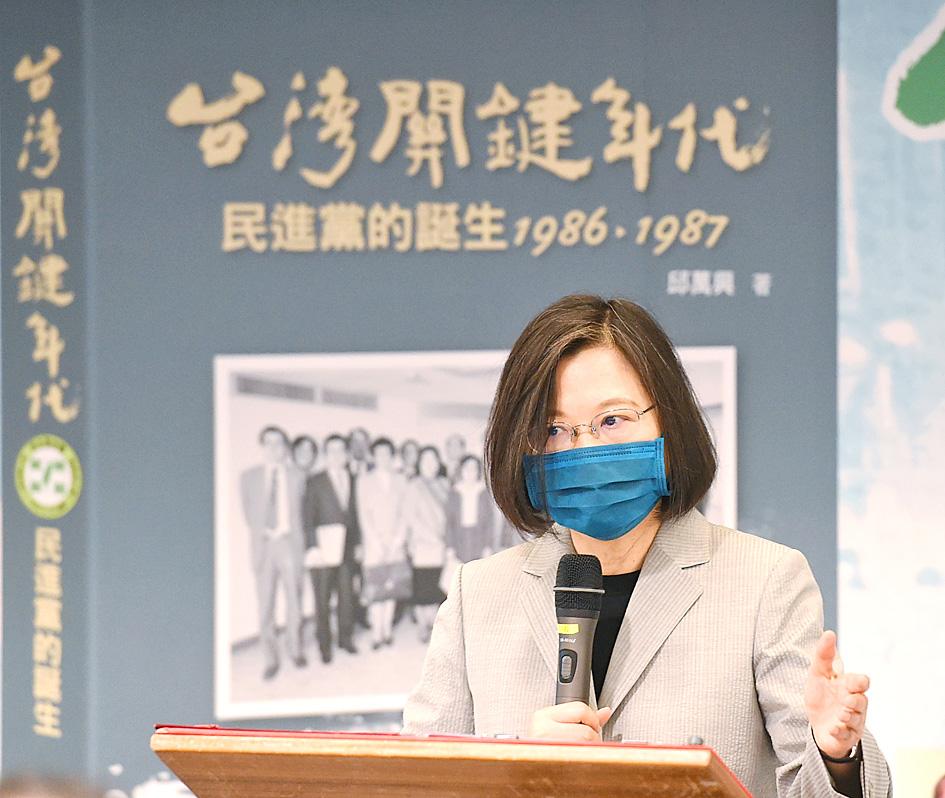Senior Democratic Progressive Party (DPP) members gathered in Taipei yesterday to launch a book on the party’s early history.
The launch of photographer Chiu Wan-hsing’s (邱萬興) Taiwan’s Defiant Years: The Rise of the DPP 1986-1987 (台灣關鍵年代 : 民進黨的誕生 1986-1987) was part of a series of activities to mark the 35th anniversary of the party’s founding on Sept. 28, 1986, at the Grand Hotel Taipei.
“We must never forget the DPP’s original spirit and the party’s founding principles. Taiwanese have much expectation for the DPP, and we must remember this responsibility,” President Tsai Ing-wen (蔡英文), who is the DPP’s chairperson, said in her keynote address.

Photo: Fang Pin-chao, Taipei Times
Chiu has for years been associated with the DPP, donating many photographs, early DPP publications and election pamphlets to the party for the establishment of a museum celebrating the the DPP’s history.
Several DPP founding members attended the event, including Legislative Speaker You Si-kun (游錫堃), former Taipei county commissioner You Ching (尤清) and former DPP chairman Yao Chia-wen (姚嘉文).
Those who were present at the DPP’s founding event recalled the tense atmosphere as many feared that then-president Chiang Ching-kuo (蔣經國), who was also the Chinese Nationalist Party (KMT) chairman at the time, might order security forces to crack down on the newly founded party.
There were rumors that opposition leaders would be arrested, they said.
You Ching said that he made calls to foreign news organizations upon arriving home from the event.
It was urgent to announce the party’s founding to the world, he said, adding that it was crucial that foreign media reported the event.
In the party’s early days, DPP members lobbied foreign governments to support Taiwan’s push for democracy and recognize the atrocities committed by the KMT during the waning Martial Law era, he said.
The events led to then-Washington Post publisher Katharine Graham’s trip to Taiwan to interview Chiang on Oct. 6, 1986.
Chiang told Graham that the government would lift martial law and introduce reforms and policies to liberalize Taiwan, You Ching said.
In the interview, Chiang also said that any newly formed party would need to adhere to the Republic of China Constitution and contribute to countering the agenda of communist China, You Ching said.
The interview assured DPP members that “Chiang had come to accept the DPP’s existence,” he said.

A decision to describe a Chinese Ministry of Foreign Affairs statement on Singapore’s Taiwan policy as “erroneous” was made because the city-state has its own “one China policy” and has not followed Beijing’s “one China principle,” Deputy Minister of Foreign Affairs Tien Chung-kwang (田中光) said yesterday. It has been a longstanding practice for the People’s Republic of China (PRC) to speak on other countries’ behalf concerning Taiwan, Tien said. The latest example was a statement issued by the PRC after a meeting between Singaporean Prime Minister Lawrence Wong (黃循財) and Chinese President Xi Jinping (習近平) on the sidelines of the APEC summit

Taiwan’s passport ranked 34th in the world, with access to 141 visa-free destinations, according to the latest update to the Henley Passport Index released today. The index put together by Henley & Partners ranks 199 passports globally based on the number of destinations holders can access without a visa out of 227, and is updated monthly. The 141 visa-free destinations for Taiwanese passport holders are a slight decrease from last year, when holders had access to 145 destinations. Botswana and Columbia are among the countries that have recently ended visa-free status for Taiwanese after “bowing to pressure from the Chinese government,” the Ministry

‘SIGN OF DANGER’: Beijing has never directly named Taiwanese leaders before, so China is saying that its actions are aimed at the DPP, a foundation official said National Security Bureau (NSB) Director-General Tsai Ming-yen (蔡明彥) yesterday accused Beijing of spreading propaganda, saying that Chinese President Xi Jinping (習近平) had singled out President William Lai (賴清德) in his meeting with US President Joe Biden when talking about those whose “true nature” seek Taiwanese independence. The Biden-Xi meeting took place on the sidelines of the APEC summit in Peru on Saturday. “If the US cares about maintaining peace across the Taiwan Strait, it is crucial that it sees clearly the true nature of Lai and the ruling Democratic Progressive Party (DPP) in seeking Taiwanese independence, handles the Taiwan question with extra

HEALTHCARE: Following a 2022 Constitutional Court ruling, Taiwanese traveling overseas for six months would no longer be able to suspend their insurance Measures allowing people to suspend National Health Insurance (NHI) services if they plan to leave the country for six months would be abolished starting Dec. 23, NHIA Director-General Shih Chung-liang (石崇良) said yesterday. The decision followed the Constitutional Court’s ruling in 2022 that the regulation was unconstitutional and that it would invalidate the regulation automatically unless the NHIA amended it to conform with the Constitution. The agency would amend the regulations to remove the articles and sections that allow the suspension of NHI services, and also introduce provisional clauses for those who suspended their NHI services before Dec. 23, Shih said. According to